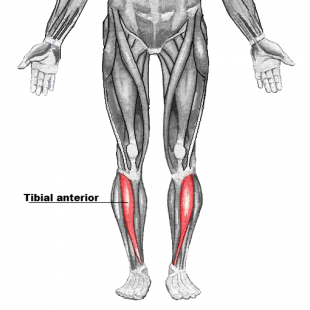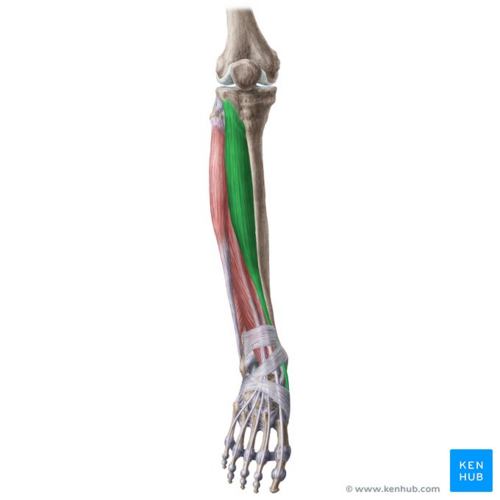Tibialis Anterior
Original Editor - Daniele Barilla
Top Contributors - Daniele Barilla, Joao Costa, Kim Jackson, Ahmed Nasr, Nikhil Benhur Abburi, George Prudden, Simisola Ajeyalemi, Evan Thomas, Oyemi Sillo and WikiSysop;
Description[edit | edit source]
The Tibialis anterior (Tibialis anticus) is situated on the lateral side of the tibia; it is thick and fleshy above, tendinous below. The fibers run vertically downward, and end in a tendon, which is apparent on the anterior surface of the muscle at the lower third of the leg. This muscle overlaps the anterior tibial vessels and deep peroneal nerve in the upper part of the leg.
Variations.—A deep portion of the muscle is rarely inserted into the talus, or a tendinous slip may pass to the head of the first metatarsal bone or the base of the first phalanx of the great toe. The Tibiofascialis anterior, a small muscle from the lower part of the tibia to the transverse or cruciate crural ligaments or deep fascia.[1]
Origin[edit | edit source]
It arises from[1]:
- Lateral condyle and upper half or two-thirds of the lateral surface of the body of the tibia
- Adjoining part of the interosseous membrane
- Deep surface of the fascia
- Intermuscular septum between it and the Extensor digitorum longus.
Image: Tibialis anterior (highlighted in green) - anterior view[2]
Insertion[edit | edit source]
Medial and under surface of the first cuneiform bone, and the base of the first metatarsal bone.[1]
Nerve[edit | edit source]
Deep Pereonal Nerve (L4, L5, S1)[1]
Artery[edit | edit source]
Anterior Tibial Artery[1]
Function[edit | edit source]
- Tibialis anterior is the primary dorsiflexor of the ankle with synergistic action of extensor hallicus longus, extensor digitorium longus and peroneous tertius.
- Inversion of the foot.
- Adduction of the foot.
- Contributor of maintaining the medial arch of the foot.[3]
- At anticipatory postural adjustment (APA) phase during gait initiation tibialis anterior favour knee flexion at the stance limb by causing forward displacement of tibia.[4]
- Eccentric deceleration of foot plantarflexion, eversion and foot pronation.
Integrated Anatomy[edit | edit source]
Tibialis anterior is one of the muscles that tend to be inhibited and underactive[5] this leads to overactive of synergistic muscles; extensor hallicus longus, extensor digitorium longus and peroneous tertius.
People with an inhibited or weak Tibialis anterior, for example those with hemiplegia or parkinson's, will have an abnormality in their anticipatory postural adjustment (APA) phase during gait initiation of the affected limb. They will try to compensate for the weakness of Tibialis anterior by overactivity of the contralateral tensor fascia latae (TFL)[4]
Video[edit | edit source]
Clinical Relevance[edit | edit source]
Pain along the path of this muscle is often referred to as "Shin splints". Also called medial tibial stress syndrome (MTSS)
Assessment[edit | edit source]
Palpation[edit | edit source]
The client is supine. Place your resistance hand on the medial side of the distal foot.
Resist the client from dorsiflexing and inverting the foot. Look the distal tendon of the tibialis anterior on the medial side of the ankle joint and foot; it is usually visible.
Palpate the distal tendon by strumming perpendicular across it. Continue palpating the tibialis anterior proximally to lateral tibial condyle by strumming perpendicular to the fibers.
Once the tibialis anterior has been located, have the client relax it and palpate to asses its baseline tone.[7]
Power[edit | edit source]
The action of the tibialis anterior muscle is considerably stronger than that of the other three dorsiflexor muscles of the foot.[8]
Treatment[edit | edit source]
Strengthening[edit | edit source]
Stretching[edit | edit source]
Dry Needling[edit | edit source]
Resources[edit | edit source]
See also[edit | edit source]
Shin Splints
Ankle and Foot
Strength
References[edit | edit source]
- ↑ 1.0 1.1 1.2 1.3 1.4 Drake R, Vogl W, Mitchell AWM 2004 Gray’s Anatomy for Students. Edinburgh: Churchill Livingstone.
- ↑ Tibialis anterior (highlighted in green) - anterior view image - © Kenhub https://www.kenhub.com/en/library/anatomy/tibialis-anterior-muscle
- ↑ Pasqualino A., Panattoni G.L. 2002 Anatomia Umana. Utet
- ↑ 4.0 4.1 Jean LH, Marco S, Oscar C , Manh CD. The Neuro-Mechanical Processes That Underlie Goal-Directed Medio-Lateral APA during Gait Initiation. Frontiers Human Neuroscience. August 2016
- ↑ Advantage strength. Therapy Thursday: You’ve been crossed over. Available from: http://advantagestrength.com/therapy-thursday-youve-been-crossed-over/ (24JULY 2019)
- ↑ Judson Laipply. Anatomy Of The Tibialis Anterior Muscle - Everything You Need To Know - Dr. Nabil Ebraheim Available from:https://www.youtube.com/watch?v=zUUVueyaDlM&t=203s [last accessed 31/8/2021]
- ↑ Joseph E. Muscolino, 2011 Know the Body: Muscle, Bone, and Palpation Essentials. Mosby 1st Edition
- ↑ Pirola V. 2004 Cinesiologia. Edi-Ermes
- ↑ eHowFitness. Tibialis Anterior Exercises With Resistance Bands: Spice Up Your Workout Routine. Available from: https://youtu.be/dG0uWjEviCs
- ↑ Brookbush Institute. Tibialis Anterior Activation Available from: https://www.youtube.com/watch?v=eFxnmgRTuAM [last accessed 31/8/2021]
- ↑ Jason Craig. Tibialis Anterior Stretching. Available from: https://youtu.be/RgQOjtm9POw
- ↑ Tim Trevail. Dry Needling: Tibialis Anterior. Available from: https://youtu.be/RmPU0pT8I0g
- ↑ Tibialis anterior muscle video - © Kenhub https://www.kenhub.com/en/library/anatomy/tibialis-anterior-muscle








